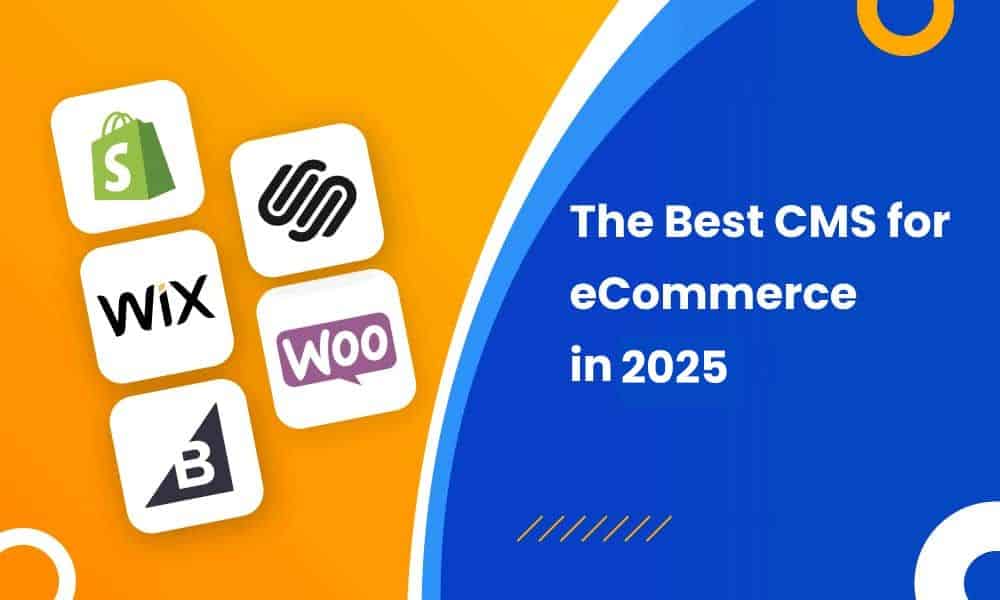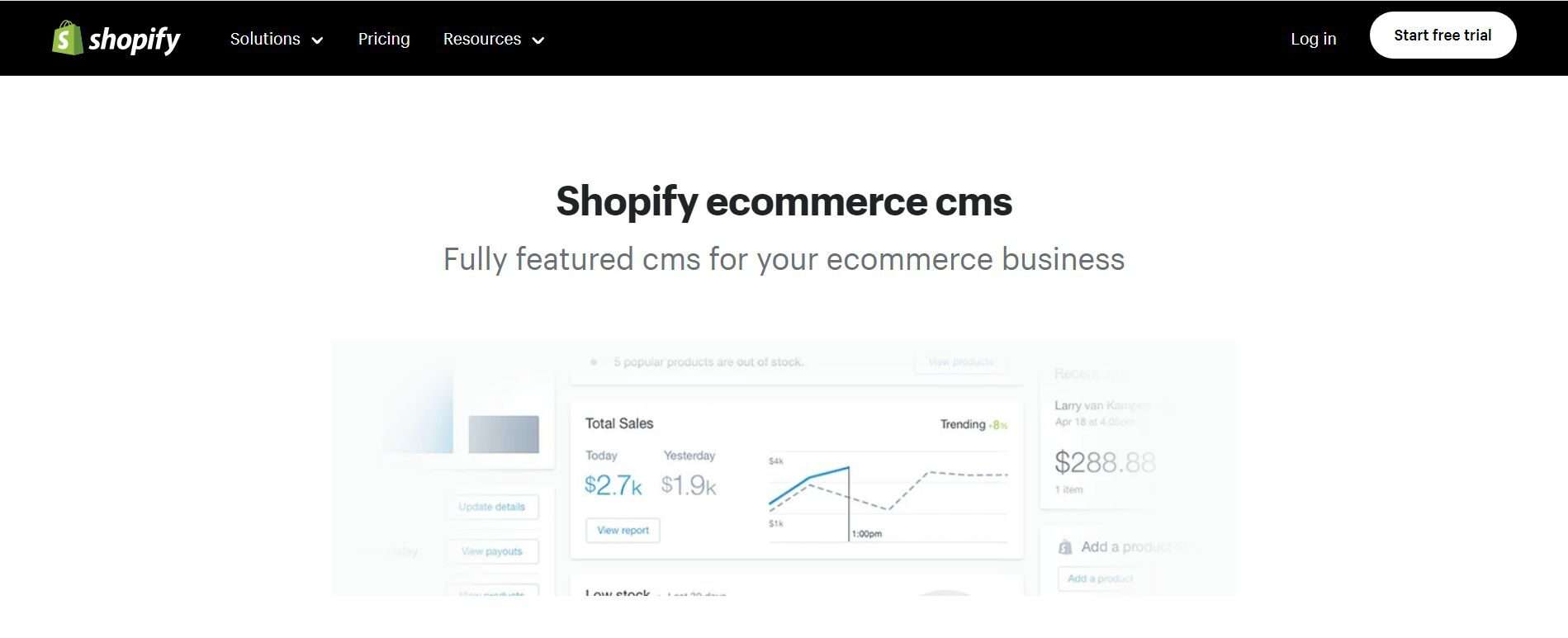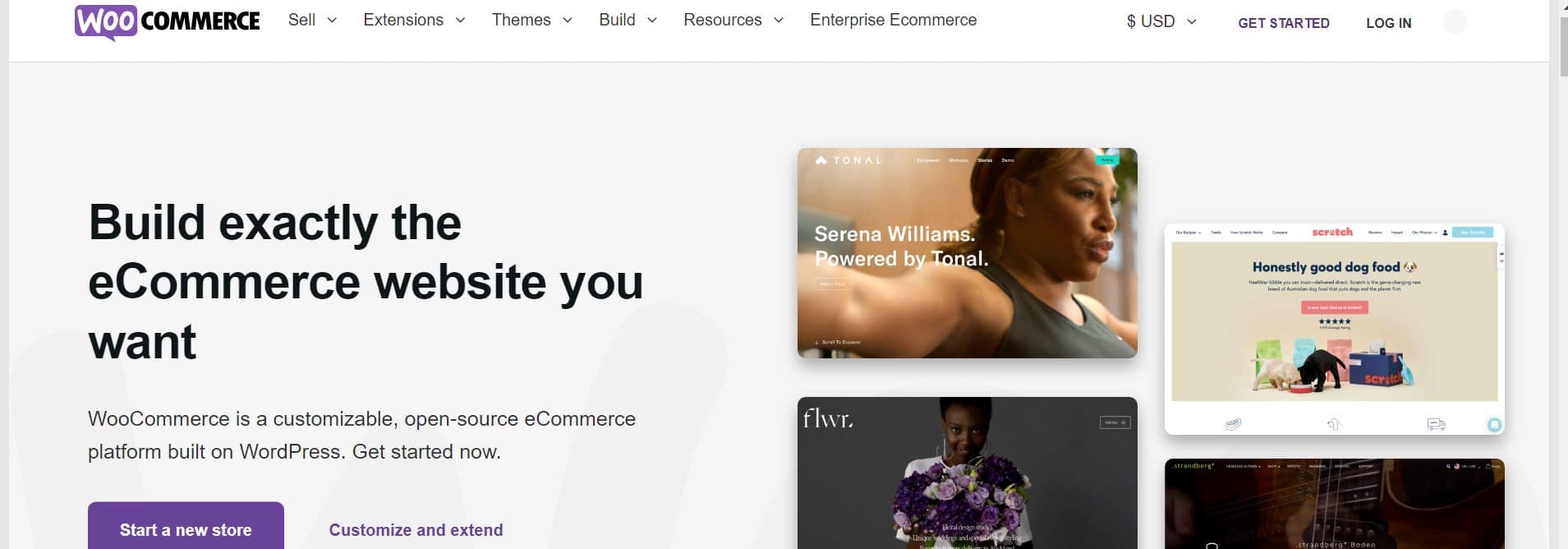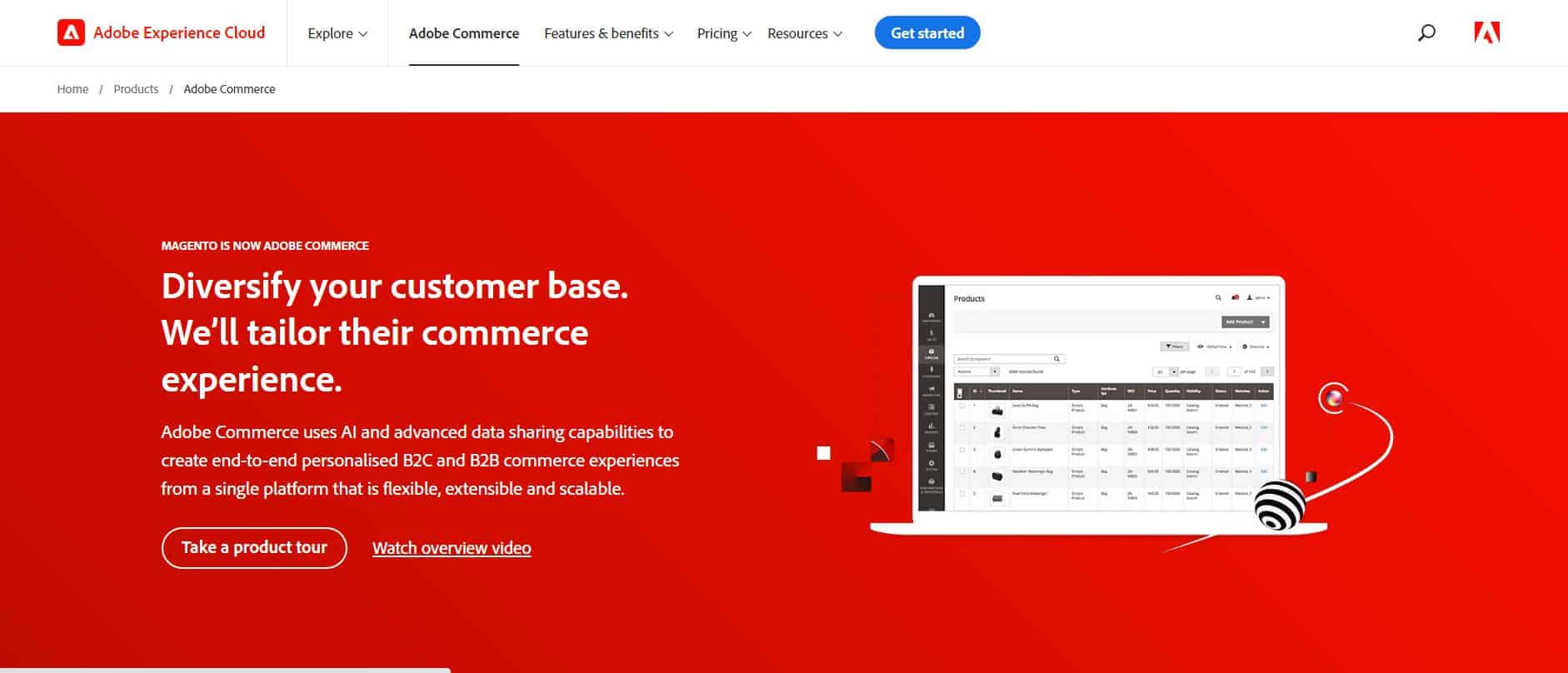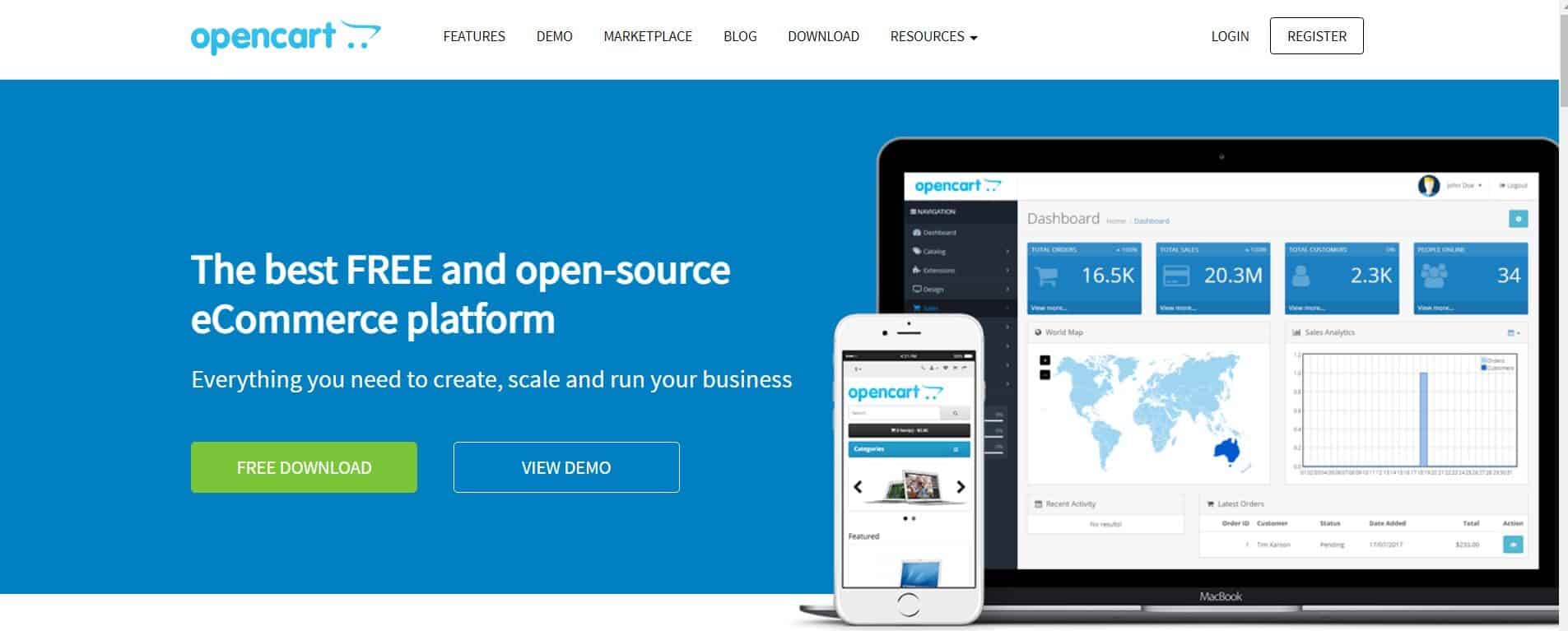The eCommerce industry has been experiencing rapid growth in recent years, which is expected to continue for the next few years.
A study by Statista indicates that global retail eCommerce revenues are anticipated to reach 7.3 trillion USD by 2025. Even with uncertainties looming in the retail market, especially with the fear of recession and the after-effects of the global pandemic, this industry has seen confident and quick expansion.
A report released by the U.S. Department of Commerce indicated that in the 4th quarter of 2022, 16% of all sales were made through eCommerce platforms. This makes an eCommerce store one of the best sales options for upcoming and established businesses.
Though opening an online store for your business may seem easy, the eCommerce retail industry is highly competitive. This makes it essential to have a solid business foundation that can help you increase sales and achieve business success rapidly.
This is where eCommerce CMS platforms come into the picture. In this blog post, we’ll look at some of the best CMS options for eCommerce business owners.
Table of Contents
What Does eCommerce CMS Mean?
CMS stands for content management system, a software solution that enables the creation and modification of digital content. This system makes it easier for business owners to publish and manage content without developing codes.
A CMS platform enables users to change the layout of the product pages, add advertising banners, or create new website segments for their online store to improve product promotion.
eCommerce CMS platforms can be typically classified into two types: open source and SaaS.
Open-source CMS
Customers have complete control over the website’s functioning in this CMS platform. This implies that store administrators are in charge of choosing the web host for the eCommerce site, keeping the server updated, and installing new programs as needed.
SaaS CMS
The SaaS eCommerce CMS is cloud-based and does not necessitate any separate server. Owners of the B2B eCommerce platform will be charged a subscription fee in exchange for the software provider managing upgrades, handling downloads, and handling data storage for them.
The 10 Top eCommerce CMS Solutions in 2025
If you’re looking for an eCommerce CMS, you have plenty of options in the market. We’ve compiled only the most popular ones here.
| eCommerce CMS software | Starting price | G2 rating |
| Shopify | $29/month | 4.4 |
| Wix | $17/month | 4.2 |
| BigCommerce | $29.95/month | 4.2 |
| Squarespace | $26/month | 4.4 |
| WooCommerce | Open-source | 4.4 |
| WordPress | Open-source | 4.4 |
| Drupal | Open-source | 3.8 |
| Adobe Commerce (Magento) | Custom | 4.0 |
| OpenCart | Free | 4.3 |
| Volusion | $29/month | 3.2 |
1. Shopify
Shopify is an excellent, flexible, all-in-one eCommerce CMS platform with many unique features. Thousands of companies worldwide use this SaaS headless commerce platform for their CMS operations.
The online website builder resource ‘websitebuilderexpert.com’ gives this content management platform a rating of 4.6 out of 5. The Shopify pricing starts at $29 per month and can go up to $299 monthly.
Features include the following:
- Intuitive settings for easy customization of the storefront.
- Allows complete access to your website’s CSS and HTML.
- Mobile eCommerce shopping cart.
- Several orders can be filled with a single click.
- Discount codes, gift cards, and integration with social media.
- Product import and export using CSV files.
Advantages
- Simple and convenient content management solution.
- The interface is user-friendly, and it offers professional, mobile-friendly, and beautiful themes.
- Reliable and easy-to-understand payment platforms.
- Offers 24/7 customer support.
Disadvantages
- It is not versatile enough to give your online eCommerce store additional CMS features.
- You need to pay for several Shopify themes.
- You might require professional assistance to get comprehensive theme customization.
- You may need to install the app to access certain useful CMS features.
16 Powerful Shopify Marketing Strategies To Stand Out
2. Wix
This content management solution is best suited for businesses that have few commodities and wish to quickly build an eCommerce platform for their company without having to know any coding. Although technically, it is not a CMS platform, the site owners can include the eCommerce platform when needed.
Small business owners can add ecommerce to website without needing extensive technical knowledge, offering a straightforward way to broaden their online presence and reach more customers.
There are around 500 templates available, but clients must sacrifice some customizability for practicality and convenience. Around 3.7% of websites utilize Wix as their content creation and management solution. The pricing starts at $17 per month and can go up to $35.
Features include the following:
- 500+ design templates.
- Makes multichannel sales easier.
- Wix Owner application enables mobile business management.
- Supports blogging.
Advantages
- It can be easily integrated with third-party applications and social media platforms.
- Inexpensive compared to other SaaS-based alternatives.
- It can be used without professional help.
Disadvantages
- Limited customization features make it unsuitable for large corporations.
- Scalability may become a concern when your online business expands.
- Many features are available only with premium plans.
The 5 Best eCommerce Platforms for Startups
3. BigCommerce
This is one the best SaaS eCommerce platforms that aids business owners in the creation, management, and upkeep of their online stores. According to surveys, around 0.3% of websites utilize Wix as their content management solution. It offers services to around 60,000 businesses of different sizes and types.
Along with offering e-stores exceptional scalability, BigCommerce CMS also provides sophisticated SEO and integration with multiple channels. The typical pricing starts at $29.95 per month and can go up to $299.95 monthly. Custom pricing is also available for enterprises.
Features include the following:
- A drag-and-drop landing page builder, making it easy for businesses to develop and edit webpages.
- Easy and simple checkout customization.
- WordPress integration.
- Features to make the website mobile-friendly.
- Strong support system for blogging, making it a great marketing tool
- 12 basic design templates.
- Several online payment channels, including PayPal.
Advantages
- Fast-loading and user-friendly.
- Fields can be customized easily.
- Easy CMS integration with third-party plugins or apps.
- Unlimited employee accounts.
- Efficient for SEO.
- Good customer service.
Disadvantages
- It is not an open-source eCommerce platform and, therefore, is a bit pricey.
- The integrated blog doesn’t support RSS feeds.
- Annual online sales volumes are capped, so if you want more, you’ll have to change to a more expensive monthly plan.
Read also: eCommerce Support Technologies To Help Build Your Moat
4. Squarespace
This beginner-friendly and popular SaaS CMS platform enables almost anyone to develop a stunning and effective online business site.
According to research, from 2011 to 2022, the CMS market share of Squarespace increased from 0.2% to 3.0%, a 2.8% rise.
Squarespace offers users several essential eCommerce services, including social media solutions, email marketing, logo creation tools, etc. The pricing can range from $26 to $40 per month.
Features include the following:
- Plenty of choices for shipping, payment processing, and order management.
- eCommerce analytics page to assess their performance — a great CMS feature.
- Third-party plugins and applications.
- Enables your customers to customize their purchases effortlessly.
- You can get the domain name for free.
- Easy, powerful blogging support.
Advantages
- It allows unlimited items to be placed in the store.
- Zero transaction costs.
- Plenty of top-notch design templates are available.
- Simple to use and offers a free security certificate.
- 24/7 customer chat support.
Disadvantages
- Lacks customer assistance over the phone.
- No cutting-edge digital marketing tools are available.
- The learning curve might be confusing for some employees.
eCommerce Integration: Do You Need It?
5. WooCommerce
WooCommerce, an open-source and free CMS, has recently seen significant growth. A survey by Statista has indicated that WooCommerce had a 36.68 percent market share in 2022, making it the most prominent eCommerce technology platform.
This platform offers a variety of options for WordPress-powered eCommerce sites. The platform also helps with catalog creation, order management, and revenue generation from customer registration.
Features include the following:
- Supports over 140 regional payment gateways and offers secure payments.
- Unlimited customization.
- Plenty of free SEO add-ons.
- Over 1,300 themes.
- A vast array of in-shop advertising extensions.
Advantages
- SEO-friendly.
- Open-source.
- Multilingual.
- Offers the best security.
- Easy mobile optimization.
Disadvantages
- Users will need a comprehensive knowledge of the platform.
- Some add-on features are paid.
- Users should pay separately for hosting as well as domain.
- The WooCommerce plugin occasionally has trouble adjusting to WordPress’ regular upgrades.
- Only WordPress themes are compatible with the platform.
WooCommerce vs Magento: A Complete, Unbiased Overview
6. WordPress
WordPress is an eCommerce giant powering around 14.7% of the top websites in the world. The CMS market share of WordPress is estimated to be 60.8% by a survey conducted by Kinsta Inc.
However, this popular CMS player is not an online commerce website in itself. The WooCommerce extension is necessary to convert a WordPress website into a retail website. Although customers can access basic features free of cost, premium plans include a business plan at $25 per month and an eCommerce plan at $45 per month.
Features include the following:
- Plenty of fantastic eCommerce plugins.
- Allows integration of payment gateways.
- Easy to publish both text and visual content.
- Options for both free and premium themes are endless.
- Users can link their social media profiles.
- There are several free SEO plugins available.
Advantages
- Open-source and free platform.
- Enables retail sites to have a distinct look.
- Users have access to numerous plugins.
Disadvantages
- Businesses need to make hosting arrangements.
- There is no technical support.
Read also: Top Website Header Examples to Inspire Your Design
7. Drupal
Drupal is one of the best eCommerce CMS platforms and enables eCommerce companies to create sophisticated websites from the very beginning. It is not a comprehensive website builder but rather a framework to build on. Around 1.8% of websites utilize Drupal. It is free to use.
Features include the following:
- Customizable and flexible.
- Great choices for building mobile websites.
- Supports multiple languages.
- SEO-friendly.
- Integrated workflow system.
Advantages
- No compulsion to use SaaS CMS platforms.
- Users can quickly produce content and publish it whenever they want.
Disadvantages
- Challenging to use.
- No technical support.
- Very few third-party plugins and apps.
A Smart Guide to eCommerce Website Development
8. Magento
Magento (now called Adobe Commerce), obtained by Adobe in 2018, supports around 260,000 shops worldwide.
The Open Source platform enables the creation of web stores with minimal features at no cost; however, Magento Commerce costs more for sophisticated capabilities priced at $22,000–125,000 per year. It serves companies of all sizes.
Features include the following:
- Offers drag-and-drop features to create websites.
- Users can develop, preview, and publish content easily.
- Many add-ons for ERP, CRM, and chatbot support are available.
Advantages
- Supports multiple languages and currencies.
- Fast-loading, secure, and user-friendly.
- Easy to upgrade.
Disadvantages
- Steep learning curve.
- Expensive.
- Requires hosting.
Read also: Magento vs Shopify Buying Guide: Which is Better and Why?
9. OpenCart
This free platform is an excellent option for companies on a tight budget. It is feature-rich, inexpensive, and simple to use. It has a moderate learning curve and requires just rudimentary technological skills to operate the business.
Also, a number of business services are available for additional fees. About 0.8% of websites utilize OpenCart.
Features include the following:
- A big Opencart store with over 14,000 extensions.
- Monitoring of store performance, including overall revenues, orders, and customers.
- Supports a variety of shipping options and payment gateways.
Advantages
- Inexpensive.
- Easy to use.
- Customizable.
Disadvantages
- Limited SEO and security features.
- Performance issues.
eCommerce Metrics Made Easy: How to Drive Growth
10. Volusion
This cloud-based platform is perfect for small enterprises that only sell a few types of products. It has built-in marketing, payment collecting, and inventory management tools. Its market share is about 0.02%.
The plans include personal at $29/month, professional at $79/month, and business at $299/month.
Features include the following:
- A wide range of integrations and tools.
- Drag-and-drop feature.
- Store expansion to platforms like eBay and Amazon.
Advantages
- Beginner-friendly.
- Good customer support.
Disadvantages
- Expensive.
- The Professional and Personal plans limit the number of products you can sell.
19 eCommerce Best Practices to Win Customer Confidence
Things to Consider While Selecting an eCommerce CMS
Choosing eCommerce CMS software for a business is a crucial decision for a company since it is instrumental in the business performance of an online business.
Hence, it is advisable to examine the advantages and disadvantages of eCommerce software before deciding on the one best suited for the business needs of your eCommerce website.
Some factors that should be considered when selecting an eCommerce CMS solution include the following.
SEO resources
The eCommerce CMS system chosen for a business’s online store must be SEO-friendly. SEO resources with a CMS eCommerce solution will enable businesses to be more search engine friendly.
Customizations
A top-notch user experience is an important factor affecting the success of an online store. Customizations play a big role in providing the best user experience in an eCommerce site.
An eCommerce CMS with excellent customization features will enable businesses to completely alter the layouts of their websites, making it appealing to the consumers visiting these web pages.
The Beginner’s Guide to eCommerce Marketing Automation
Ease and simplicity of use
Extremely complicated CMS features and tools can make it difficult for your staff to understand them, and you may have to rely on external help to manage your daily operations.
This can lead to extra expenses that can be easily avoided by choosing an easily understandable CMS solution for your eCommerce business.
Customer support and pricing
The CMS platform should be budget-friendly and offer good technical support in case of issues. A strong online community can also be advantageous.
Security and scalability
A CMS platform should provide efficient protection against spamming, phishing, and similar security threats. Similarly, it should also be able to support changing needs as the business grows.
17 Fresh eCommerce Marketing Ideas
Conclusion
That’s our list of the top 10 CMS solutions for eCommerce entrepreneurs.
Let us know if we missed out on any great ones or if you’ve tried any of these. If you need a marketing solution for your eCommerce business, you can try EngageBay for free.
